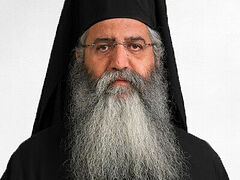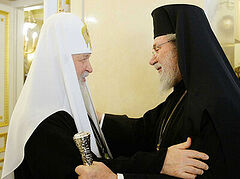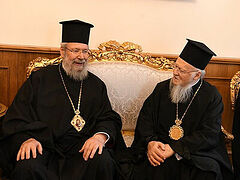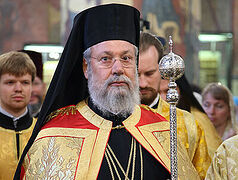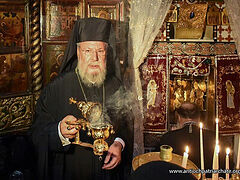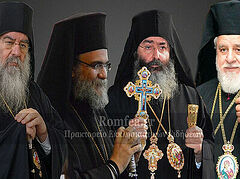Nicosia, Cyprus, November 2, 2020
In a new interview with the Kathemirini newspaper, Archbishop Chrysostomos of Cyprus commented again on his decision to commemorate Epiphany Dumenko, the head of the “Orthodox Church of Ukraine,” recognized as schismatic throughout the Orthodox world.
In particular, the Cypriot primate made a number of strong statements about the four hierarchs who called on him to renounce this decision. In his estimation, they are a parasynagogue and have launched a conspiracy against him, which is worthy of defrocking.
In the interview, also published on Romfea, the Archbishop also grieves that his Synod has bishops who didn’t go to seminary as he did.
Asked why he decided to recognize the OCU, Abp. Chrysostomos that he “did it for a good reason.” As he has in many places, he explained that he has represented the Church of Cyprus at pan-Orthodox gatherings for 30 years, and thus he is well aware of the view of all Local Churches on such matters, and thus can act as a mediator between primates.
Despite this experience, the Archbishop has elsewhere stated that he only recently became aware of Constantinople’s argument that the transfer of the Metropolis of Kiev to the Russian Church 300 years ago was temporary. He used to side with the Russian Church on the Ukrainian issue, but now he understands the situation better, he said.
In his new interview he recalls that he could see that one Church wanted to interfere with another, and he was the only who reacted, saying: “Brethren, we have all become national Churches; first we are the nation and then Orthodox. That's a mistake. We must be Orthodox first, and then a nation. Orthodoxy must come to the fore and we must be united.”
Recall that the OCU was created on a nationalistic ideology of driving out the “Russian” Church, as openly stated by former President Petro Poroshenko and OCU hierarchs.
As he wrote in his recent letter to Patriarch Bartholomew, Abp. Chrysostomos notes that besides the Churches of Antioch, Alexandria, Jerusalem, and Cyprus, all others have received their autocephaly from Constantinople. However, the Archbishop fails to note that the Georgian Church in fact received its autocephaly from Antioch in the first millennium.
Even Russia received its autocephaly from Constantinople, the Archbishop recalls, and in the case of Ukraine, it was given to the Russian Church for guardianship, like the New Lands in Greece today, he writes. Bishops of the New Lands in Greece today remain hierarchs of Constantinople, while Ukrainian hierarchs were never considered hierarchs of Constantinople after Kiev was transferred to the Russian Church. In 2016, at a preparatory session for the Council of Crete, Pat. Bartholomew himself explicitly acknowledged the Ukrainian Church as part of the Russian delegation.
However, the Archbishop goes on to accuse the Russian Church of interfering in Ukraine, as well in Georgia, Poland, and Romania. And who gave it the right to grant autocephaly to its own churches in America, he wonders. These interventions have all caused upheavals in Orthodoxy, he says.
Conversely, the Cypriot Church is “Orthodox first and then Greeks,” and it is proud of this, he states.
The Russian Church, on the other hand, is probably hoping to send a few more Russians to the Cypriot city of Limassol and then send a Russian bishop to care for them, although this is not a real threat because the Cypriot Church is too well organized, he says.
Abp. Chrysostomos also states that he decided to write to Pat. Bartholomew when he was in the hospital after having back surgery, to state he could no longer undertake his mediatory work, meeting with the primates of other Local Churches. He underwent back spinal surgery last month, while he had in fact given up his mediating role over a year ago, after he learned that his efforts angered Pat. Bartholomew.
Instead, he resolved to commemorate Epiphany Dumenko, as he wrote to Pat. Bartholomew. He decided, he continues, not to tell the bishops of the Cypriot Church of his decision because he knew they would not have approved. As he explains, had he told them, they would have objected, and he would have had to tell them to their faces that he would not take their objections into consideration.
“Sorry, but that’s my right, so I did it,” the Archbishop stated.
As His Eminence Metropolitan Athanasios of Limassol earlier revealed, the Archbishop had in fact already promised the Synod that he would not commemorate Epiphany.
The four bishops who called on the Archbishop to renounce his decision—Met. Athanasios together with Metropolitans Nikiforos of Kykkos, Isaiah of Tamassos, and Bishop Nicholas of Amathountos—have not specifically called for a Synod session to discuss the matter, the Archbishop states.
Instead, they have formed a “parasynagogue,” he accuses.
“They blame me,” he tells Kathemirini, when in fact they were the ones who got together behind his back, he states. This constitutes a conspiracy, the Cypriot primate believes, and is, strictly speaking, worthy of the canonical punishment of being defrocked.
“What they condemn they do themselves, and I am silent, to see how far their illegality will reach,” the Archbishop says.
According to St. Basil the Great, a “parasynagogue” is formed when a cleric who has been suspended from liturgical functions continues to serve and pulls others in with him. Unfortunately, the Archbishop does not explain in detail how four bishops discussing a matter and drafting an appeal should be viewed as a parasynagogue.
Furthermore, the Archbishop is astonished that a young bishop like Met. Isaiah of Tamassos would have the nerve to speak up against him. Met. Nikiforos of Kykkos is old enough and has earned the right to speak, the Cypriot primate says, but the Metropolitan of Tamassos should remain silent, especially considering that it was Abp. Chrysostomos who consecrated him.
Met. Isaiah has described the Archbishop’s decision as “cunning, suspicious, and catastrophic.”
“This is too much. It’s immoral… Shame on him,” Abp. Chrysostomos says. It’s too late for Met. Isaiah of Tamassos to fix relations with the Archbishop, says the latter—he’s already said what he said.
And why didn’t the bishops simply go to the Archbishop and speak with him, rather than writing an appeal, Abp. Chrysostomos wonders. Because they are too selfish and irresponsible, he answers.
Asked if he has ever thought of retiring, given his age and his health, Abp. Chrysostomos says he has thought about it, but thinks the other bishops would “kill each other” if he stepped down.
The Archbishop is very grieved that he has a Synod of bishops who didn’t go to seminary as he did. “When you have brothers with this mentality, do you think about stepping down?” he asks rhetorically.


